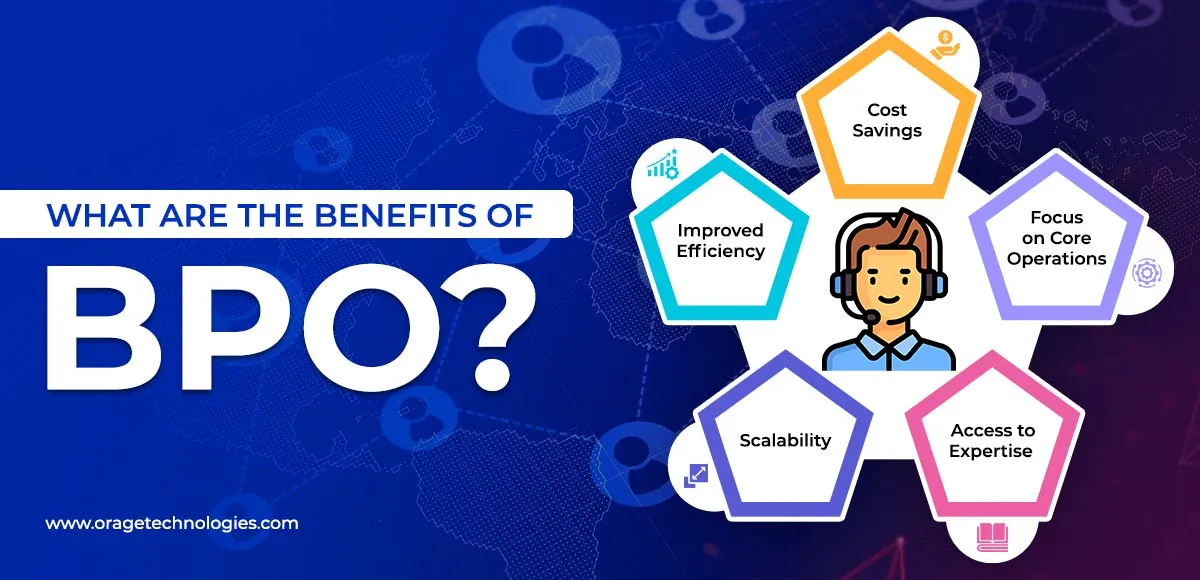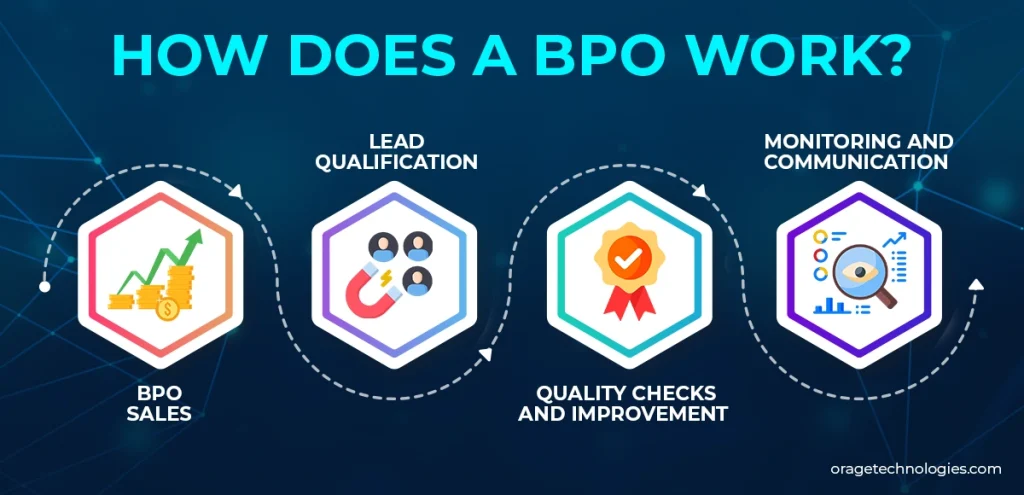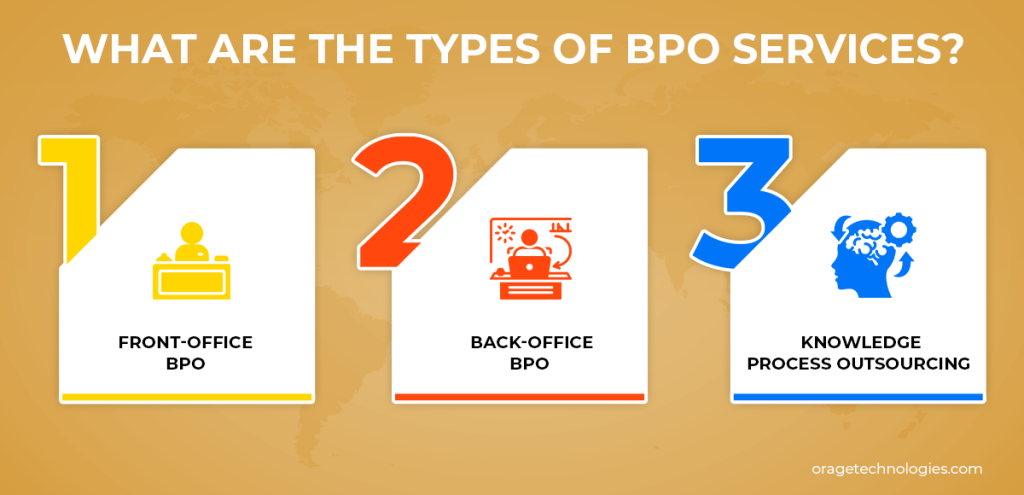
Divya Stuti, with over 5 years of experience in Digital Marketing & Content Writing, has a knack for turning complex Marketing strategies, trends, and jargon...
As industries are growing faster, companies are looking to outsource many activities to expert BPO service providers. Business Process Outsourcing rose from $245.9 billion in 2021 to $329.9 billion in 2022. And since then, it has been growing like never before. According to Investopedia, in 2023, the global BPO market was valued at $281 billion, with a growth projection at a CAGR of 9.6% from 2023 to 2030.
But why are companies shifting from in-house teams to outsourcing non-core processes? To understand this, let’s first discuss what is BPO, its types, benefits, BPO job opportunities, and how it works.
What is BPO in Simple Words?

BPO’s full form is Business Process Outsourcing. It means the act of partnering, engaging, or outsourcing any of the top BPO companies, like Orage Technologies, to manage several procedures. These business processes may include some of the following services: call center and help desk support, data entry and conversion, accounting and bookkeeping, recruitment and staffing, etc.
By outsourcing, companies can keep up with their primary responsibilities, minimize expenses, and increase productivity. This is not just the best practice but also a strategic decision that gives much flexibility. A BPO example can be when a tech-based firm decides to outsource its customer service and payroll services to a Business Process Outsourcing service provider.
What is BPO Customer Service?
BPO Customer service is a type of support that is offered to customers before buying or accessing any product or service. Good customer service can help companies retain old customers, maintain brand reputation, and boost customer base. Customer services can operate on multiple channels, such as chat support, social media, emails, SMS, IVR, and many more.
Role of BPO (Business Process Outsourcing Services)
Earlier, companies used to handle everything in-house. For that, they had to build an in-house team, increasing expenditure and managing efficiency. But BPO services entered the market as the resolution. It allowed companies and organizations to hand over non-core operations to experts.
This outsourcing of various tasks like lead generation, sales, data entry, customer support, etc, ensured professional services at a much lower cost. This significantly reduced the operational expenses and added efficiency and time management, along with quality checks.
How Does a BPO (Business Process Outsourcing) Work?

Business Process Outsourcing works in a way that it takes up the non-core processes of various companies. These companies have a team of experts to offer different BPO services. Thus, when any company collaborates with a BPO, they get expert services at a low cost as compared to the cost they would incur if they hire an in-house team.
Not only is it a cost-effective way of managing various functions, but it also streamlines different tasks and saves processing time.
The BPO work can be broken down into various functions, such as:
1. BPO Sales
This team is dedicated to acting as external support to the sales operation. From increasing prospects and nurturing untouched leads in the sales funnel to analyzing the sales barrier, it works on end-to-end sales operations. The experts and sales professionals ensure that the sales are boosted.
2. Lead Qualification
The next important role of BPO is lead qualification. The lead qualification calls allow the company to understand the requirements of bulk leads. In turn, these leads drive a good amount of successful conversions. Some of the main work of lead qualification calls are:
- Understanding Client Requirement
- Building Compatibility
- Setting Clear Client Expectations
- Involve Open-Ended Query Sessions
- Expertise in Different Sales Qualification Processes
3. Quality Checks and Improvement
Quality check is BPO work that is responsible for checking, improving, and delivering high-quality services. It follows the guidelines offered by the client to improve the quality of calls.
4. Monitoring and Communication
Regular meetings and clear communication with the client ensure timely review and performance maintenance. This ensures progress tracking and resolves issues at an earlier stage.
Telecaller Responsibilities in BPO Jobs
BPO telecallers are at the forefront of communication between the company and its customers. They are specially trained to handle calls using the best call centre software, communicate clearly, and meet the fixed performance target.
In BPO jobs, telecallers are responsible for the following things:
- Outbound Calls – Making calls to customers or leads. These calls may have various purposes, such as sales, customer surveys, or lead generation.
- Inbound Calls – Handling these inbound calls, telecallers are responsible for addressing, assisting, and resolving issues and registering complaints.
- Customer Support – In this service, telecallers handle and resolve concerns on phone calls.
- Sales and Telemarketing – This service is related to selling or pitching products or services to prospective clients. The pitch and communication play a vital role in conversion.
What are the Types of BPO Services?

Another major factor directly related to Business Process Outsourcing services is its types. It will help you to understand exactly what is BPO. There are multiple types of BPO, but the service is mainly divided into three: the front office, the back office, and the knowledge process outsourcing.
1. Front-Office BPO
A front office BPO job is to coordinate all help desks, offer technical support, and respond to customer questions.
Due to the rising competition, BPO call centers are hired by industries in telecommunication, retail, banking, and even e-business. They provide telecalling, email, chat, and social media support in the front office service.
2. Back-Office BPO
The back office BPO deals with service delivery without direct contact with customers. All these functions are also significant for the operation of firms and companies. The common back office BPO examples include data processing, salary computation, bookkeeping, recruitment and selection, and technical support.
3. Knowledge Process Outsourcing (KPO)
KPO is an offshoot of the services offered in the hierarchical business world. It is connected with higher-level activities that require experience and certain knowledge. Examples of KPO services are legal services, accountancy and analysis, research and development writing, and content creation, among others.
The need for knowledge-intensive work about data and analytics has led to the emergence of KPO. The use of outsourcing has seen organizations cut the number of experienced professionals they require for specific tasks.
What are the Benefits of BPO?
Now that you have got the basic understanding of what BPO is, it’s time to understand why its market value is growing at an exponential rate. Business Process Outsourcing helps businesses in multiple ways. Here are some key benefits of BPO:
1. Cost Savings
Outsourcing companies provide a cheaper solution to businesses than having different teams for a particular project.
2. Focus on Core Operations
BPO companies take up the non-core processes of organizations so that they can invest their full time and effort in core operations.
3. Access to Expertise
BPO companies offer expert solutions for different processes as they have expert teams dedicated to each service they offer.
4. Scalability
Outsourcing helps to avoid issues with fluctuations in demand since outsourcing companies can accommodate the changes for their business partners.
5. Improved Efficiency
One of the primary benefits of outsourcing BPO services is that it makes it easier to eliminate workflow bottlenecks, increase cycle time, and decrease mistakes that affect productivity across the board.
Business Process Outsourcing (BPO) Examples
Business process outsourcing is one of the most popular strategies being implemented in large organizations today. Here are some examples:
1. Customer Service
The most common example of BPO services is the outsourcing of customer service. Businesses such as telecommunication, e-business, and retail sales normally use BPO call centers to deal with customer information and concerns. This makes it possible for business organizations to offer round-the-clock service to their customers without employing their personnel.
2. Data Entry and Processing
Numerous firms today contract out data input and data processing jobs to BPO firms. These tasks may take time and may often be a repetitive process. When they are outsourced, they are done accurately in less time.
3. Human Resources (HR)
A few examples of the BPO include the outsourcing of HR functions, recruitment, payroll, and benefits administration services. Outsourcing of BPO services for undertaking management of human resources leads to cost savings for the firms and fulfills the legal requirements of the country.
4. Finance and Accounting
BPO services include the administration of accounts and bookkeeping, sales and purchases, taxation, financial reporting, and other accounting services. Several outsourcing firms deal in these areas to ensure that firms obtain rightful financial services that are timely and accurate.
Conclusion
These are all the major information and a complete guide on what BPO is. Business Process Outsourcing is a game-changing strategy that helps many businesses and streamline their operation, reduce costs with the advantage of expert services. From customer service and data processing to finance and HR, BPO services cover a wide range of business functions.
FAQs
BPO or Business Process Outsourcing is a process in which one company partners with another company in order to hand over specific business operations instead of building an in-house team for that task. For instance, a tech company partners with call centers for their customer support operations.
No, BPO doesn’t mean only a call centre. This is a type of front office BPO, while its include vast range of services.
Yes, BPO is a great choice for freshers as it does not require any prior experience or expertise.
The standard qualification for BPO is matriculation. However, anyone can apply for this job.
The full form of BPO is Business Process Outsourcing.

Divya Stuti, with over 5 years of experience in Digital Marketing & Content Writing, has a knack for turning complex Marketing strategies, trends, and jargon into interesting and easy to digest blog posts. Whether she’s breaking down the SEO, Social Media or decoding campaigns, Divya knows how to make marketing feel exciting and easy to understand. Armed with a sharp eye for strategy and a storyteller’s instinct, she writes with clarity, creativity, and just the right dose of wit.
More Posts

